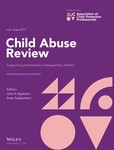Our recent triennial review of Serious Case Reviews found a high proportion (53%) of parents whose children died or were seriously harmed through abuse and neglect had mental health problems. This finding is in keeping with other research from the UK and elsewhere which has shown links between parental mental ill-health and child maltreatment.
This, however, presents us with a dilemma: while the prevalence of parental mental ill-health in this population (parents of children seriously or fatally harmed through abuse and neglect) is high, and undoubtedly higher than in the general population, the numbers are small (31 per year) in comparison to the overall numbers of adults with mental illnesses. So, for example, the UK Biobank study, which assessed 172,751 adults from 2009-10, found that 27% met criteria for a mood disorder (major depression or bipolar disorder)[1]; extrapolating this to the 13,887,000 parents with dependent children living in the UK[2], suggests that there will be at least 3.7 million parents with a current or previous mood disorder. If you extend that to include lower levels of anxiety, depression, and other mental health problems, the numbers are likely to be even higher.
So while it may be true to say that children who suffer severe or fatal child maltreatment have a high likelihood of having a parent with a mental health problem, it does not follow that any parent with a mental health problem is likely to abuse his or her child.
Hence the dilemma. Parents with mental health problems need care and support, including support around managing their mental ill-health and support in their parenting. This will not be helped by taking a stigmatising approach, nor by assuming they are not able to effectively parent their children. The vast majority of parents with mental health parents are undoubtedly good parents who love and care for their children. Nevertheless, there will be some for whom the nature or severity of their mental health problems, or the interaction between their mental health problems and other factors, do affect their ability to care for their children.
Our research identified the co-existence of parental mental ill-health with domestic violence, with substance misuse, with social isolation, or with criminal activity all as contributing to presenting risks to children. In particular, the presence of domestic violence, when combined with mental health problems in either parent, may increase the risk to the child, even (and perhaps especially) after separation. Likewise, there may be indicators in the nature or severity of the mental illness itself. So, those parents with a history of attempted suicide, or with delusional thoughts, or who had expressed some intent to harm the child may pose a distinct risk.
So the message of these Serious Case Reviews is not to label all parents with mental health problems as potential child abusers, but rather to consider what impact their mental health may be having on the child, to work with the parent to fully explore any additional risks, and to offer respectful, supportive care for the parent and the child.
Learning to respond appropriately to parents with mental health problems is a challenge for professionals. In our research report we consider some of the implications of this and how we can facilitate better quality child- and family-oriented care. In our journal, Child Abuse Review, we have recently compiled a virtual issue bringing together a number of papers from 1999-2014 which explore some of these issues in greater depth. All of these papers are freely available online for a limited period on the journal website: http://onlinelibrary.wiley.com/journal/10.1002/(ISSN)1099-0852
Contents The articles below are freely available online until 31 August 2016.
The mental health problems of mothers experiencing the child protection system: identifying needs and appropriate responses (Volume 8, Issue 1, 1999) Nicky Stanley and Bridget Penhale
Parental mental health as a child protection issue: data from the NSPCC national child protection helpline (Volume 8, Issue 3, 1999) Vanessa Lewis and Susan J. Creighton
Building bridges: the interface between adult mental health and child protection (Volume 8, Issue 3, 1999) Charmian Tye and Gretchen Precey
Parental mental health and child protection — making the links through training (Volume 12, Issue 2, 2003) Jennifer Pearce
The experiences of children living with and caring for parents with mental illness (Volume 15, Issue 2, 2006) Jo Aldridge
The mental health of mothers of physically abused children: the relationship with children’s behavioural problems — report from Japan (Volume 15, Issue 3, 2006) Tsuneo Takei, Hiroshi Yamashita and Keiko Yoshida
Maternal mental health and faltering growth in infants (Volume 16, Issue 5, 2007) Laura Dunne, Helga Sneddon, Dorota Iwaniec and Moira C. Stewart
Championing the interface between mental health and child protection: evaluation of a service initiative to improve joint working in Northern Ireland (Volume 21, Issue 3, 2012 Gavin Davidson, Joe Duffy, Liz Barry, Patsy Curry, Eithne Darragh and Judith Lees
Making Decisions about Parental Mental Health: An Exploratory Study of Community Mental Health Team Staff (Volume 21, Issue 3, 2012) Khadj Rouf, Michael Larkin and Geoff Lowe
[1] Smith DJ, Nicholl BI, Cullen B, Martin D, Ul-Haq Z, Evans J, et al. (2013) Prevalence and Characteristics of Probable Major Depression and Bipolar Disorder within UK Biobank: Cross-Sectional Study of 172,751 Participants. PLoS ONE 8(11): e75362. doi:10.1371/journal.pone.0075362
[2] http://www.ons.gov.uk/peoplepopulationandcommunity/birthsdeathsandmarriages/families/bulletins/familiesandhouseholds/2015-11-05#families









